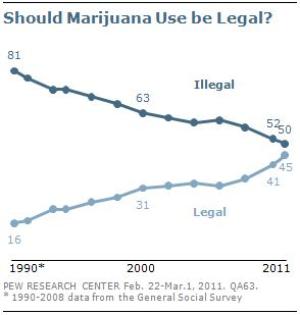Here is our overview of initiatives headed to the ballot this November. Look for in-depth coverage of the candidates and parties, as well as action in individual states, during the coming weeks.
With The Lebanese Connection, global drug trade scholar Jonathan Marshall has made an important contribution to the literature -- not only of the drug trade, but also of the Middle East, terrorism, covert operations, and failed states.
Do you read Drug War Chronicle? If so, we need your feedback to evaluate our work and make the case for Drug War Chronicle to funders. We need donations too.
The Republican platform section on crime lays out the party's official positions, and while they stay "tough on crime," there are also some hints of evolving positions.
Los Angeles dispensaries got a reprieve last week -- or did they? The busts there continue, despite the ban on the ban. And there's more news from around the state and the country as well.
Montana's first registered medical marijuana caregiver has died in federal prison after being sentenced to five years on federal drug charges stemming from the DEA raids of March 2011. Richard Flor was 68.
The Danish government could be providing heroin pills to addicts as early as next year under a proposal from the health minister.
A young man sitting in a car with a pellet gun and 50 Ecstasy tablets in the wee hours of the night Sunday is dead after an encounter with police.
The Murray County, Georgia, scandal keeps unraveling, another prison guard goes down, and a pair of South Texas deputies are going away for awhile.
The Labor Day weekend has passed, summer is behind us, and the November elections are just two months away. When it comes to drug policy and the 2012 elections, there is plenty on the table. This week, we're going to give you an overview all the drug-related campaigns (and we'll be counting on readers to let us know if we've missed anything), followed by some general discussion about the prospects for the fall and the state of the drug reform movement this election season.
Next week, we'll look at election races of interest, from the local races to the presidency, and In the weeks between now and election day, we will be doing in-depth reports on all the statewide initiative campaigns, as well as devoting as much attention as we can to some key local races and initiative campaigns.
Here's what we've got going for November 2012:
Marijuana Legalization Initiatives
Colorado -- Amendment 64 would allow adults 21 and over to possess up to an ounce of marijuana or six marijuana plants, three of which could be mature. It would create a system of state-licensed cultivation, manufacturing, and testing facilities and state-licensed retail stores. Local governments would have the option of regulating or prohibiting such facilities. The amendment would also require the state legislature to enact legislation governing industrial hemp cultivation, processing, and sale, and to create an excise tax on wholesale marijuana sales. The first $40 million of that annual revenue would be dedicated to building public schools.
Oregon -- Measure 80, the Oregon Cannabis Tax Act (
OCTA), would create an Oregon Cannabis Commission to regulate the cultivation and sale of marijuana, but not industrial hemp, which would be allowed, but not regulated by the commission. The commission would grant licenses to cultivate marijuana for sale to it by "all qualified applicants" and would sell marijuana at state retail stores at prices it determines. Medical marijuana patients would have their medicine provided at cost. The
OCTA would supersede all state and local laws regarding marijuana, except for impaired driving laws, leaving personal possession and cultivation by adults unregulated.
Washington -- Initiative 502 would legalize the possession of up to an ounce of marijuana by adults 21 and over, but does not allow for personal cultivation, except by or for medical marijuana patients. It would license marijuana cultivation and retail and wholesale sales, with restrictions on advertising. Regulation would be the remit of the state liquor control board, which would have to come up with rules by December 2013. The measure would create a 25% excise tax on marijuana sales, with 40% of revenues dedicated to the general fund and 60% dedicated to substance abuse prevention, research, and healthcare. It would create a
per se driving under the influence standard of 5
nanograms of THC per milliliter of blood.
Medical Marijuana
Arkansas -- The
Arkansas Medical Marijuana Act would allow patients suffering from specified diseases or medical conditions to use marijuana with a doctor's recommendation. It envisions a system of state-licensed nonprofit dispensaries, and would allow patients or their caregivers to grow their own only if they are not within five miles of a dispensary. In that case, patients could grow up to six flowering plants. Patients could possess up to 2 ½ ounces of marijuana.
Massachusetts -- Question 3, would allow people suffering from a debilitating medical condition to use medical marijuana upon the recommendation of a doctor with whom they have a bona fide relationship. Patients could possess up to a 60-day supply -- what constitutes that supply will be determined by the Department of Health. The initiative would also set up a system of nonprofit medical marijuana cultivation and distribution centers.
Montana -- Initiative Referendum 124 would undo the gutting of the state's medical marijuana program through the passage last year of Senate Bill 423. That bill replaced the voter-approved medical marijuana program, which allowed for dispensary sales, with a new scheme that limited providers to serving only three patients, prohibited providers from accepting anything of value in exchange for products or services, granted local governments the power to regulate providers, tightened standards for demonstrating chronic pain, and demanded reviews of doctors who certified more than 25 patients in a one-year period.
North Dakota -- the
medical marijuana initiative is not yet a done deal as we go to press.
[Update: North Dakota officials announced Thursday that the measure has failed to make the ballot after several university student signature gatherers were caught faking signatures.] Proponents needed 13,500 valid signatures and handed in more than 20,000 on August 7. State officials had 30 days from then to validate signatures. Patients could possess up to 2 ½ ounces of usable marijuana and grow up to 12 plants in an enclosed space. Caregivers could grow for one or more patients, provided they grew no more than 30 plants. The state would regulate medical dispensaries and the marijuana cultivated for them.
Sentencing
California -- Proposition 36 would reform the state's three strikes law, which allows a life sentence for a third felony conviction. The measure would allow life sentences only if the new felony conviction is "serious or violent," authorize re-sentencing for lifers if their third conviction was not "serious or violent" and if a judge determines their release would not pose an unreasonable risk to public safety, allow life sentences if the third conviction was for "certain non-serious, non-violent sex or drug offenses or involved firearm possession," and keep the life sentence for felons whose previous convictions were for rape, murder, or child molestation. If approved by voters, some 3,000 three strikes lifers could seek reductions.
Local Initiatives
California -- A number of towns, mostly in the San Diego area, will vote on local initiatives to allow medical marijuana dispensaries. Those include Del Mar, Imperial Beach, Lemon Grove, and
Solana Beach, as well as Palo Alto. The town of
Dunsmuir will vote on whether to loosen cultivation regulations.
Colorado -- Fort Collins will be voting on whether to overturn the ban on dispensaries voted in last November, and
Berthoud will be voting on whether to allow dispensaries.
Massachusetts -- In a continuation of work done in the past six election cycles, voters in a number of legislative districts will be asked a non-binding public policy question. In the First Essex and Middlesex Senate District, the Eighth Essex House District, and the Twenty-Second Essex House District voters will be asked whether they support repeal of the "federal prohibition of marijuana, as the
21st Amendment repealed national prohibition of alcohol, so that states may regulate it as they choose?" Voters in the Second Middlesex Senate District, the Middlesex and Suffolk Senate District, and the Second Berkshire House District will answer a similar question.
Michigan -- Voters in Detroit and Flint will vote on marijuana legalization initiatives, voters in Grand Rapids will vote on decriminalization, Kalamazoo will vote on an initiative to allow dispensaries, and
Ypsilanti will vote on a lowest law enforcement priority initiative.
Washington -- Voters in six cities -- Bellingham,
Bremerton, Everett, Kent, Olympia, and Spokane -- will vote on
initiatives to make marijuana the lowest law enforcement priority and prohibit local officials from cooperating with federal marijuana law enforcement activities.
The lineup of state and local initiatives has some drug reform movement spokespeople feeling pretty good.
"I think at least one state will make marijuana legal for adults this election cycle," said
Marijuana Policy Project communications director Morgan Fox. "The fact that we're discussing so many initiatives is a sign of progress. As things progress and people get increasingly sick of marijuana prohibition, we will see more and more states considering this every election cycle, and it will become more of an issue for candidates," he added.
"Politicians are starting to realize they can use this to their advantage and ignore at their peril," said Fox. "Many of them, though, don't realize how much of an effect it can have on their elections -- just ask the former US Attorney in Oregon, Dwight Holton. He didn't think his stance against medical marijuana would cost him the primary, but it did."
"I sincerely hope that one of these passes and raises the debate to whole new level, and maybe takes some of the heat off of California," said Dale
Gieringer, head of
California NORML. "These are states when you can have a good campaign for a reasonable amount of money that the drug reform movement can put up. A million dollars or two doesn't get you very far in California."
But at least one of those legalization initiatives needs to win this year, he said. "If pot gets wiped out in the elections, it's going to be tougher to win down the road."
"The sheer number of initiatives that are on the ballot and viable this cycle shows the momentum that the movement toward legalizing marijuana has," said Tamar Todd, assistant director for national policy at the
Drug Policy Alliance. "That momentum is also reflected in other ways -- in terms of the dialog we're hearing, the high support for legalization across the board, the rejection of the drug war polices of the past," she said.
"When you look in certain areas, such as the Northeast and the West, the numbers are even higher," Todd continued. "In 2010, we had a legalization initiative in California; this year we have them in three states, plus three or four medical marijuana initiatives. The number and their viability represent a real shift taking place in public opinion. The end result, no matter what happens this election cycle, is that in two years and every two years, the number and viability will continue to increase until there is actually sufficient change happening at the state level to start pushing the federal government to change its policies."
The initiatives are on the ballot. Now, they need to win.
back to top
The Lebanese Connection: Corruption, Civil War, and the International Drug Traffic, by Jonathan Marshall (2012, Stanford University Press, 261 pp., $24.95 HB)
It's harvest time in Lebanon right now, and Shiite farmers in the
Bekaa Valley are out working their fields, preparing to turn thousands of acres of cannabis plants into hashish, the Red Lebanese and Blond Lebanese for which the tiny Middle Eastern country is famous. And with the harvest comes conflict, as the country's anti-drug agency and the Lebanese Army head out into the fields to try to eradicate them.
The Chronicle reported at the beginning of August about hash farmers firing machine guns and
RPGs at eradicators, vandalizing tractors and bulldozers used to plow under the fields, and organizing street blockades in cities in the valley. Protests broke out in
Yammouneh,
Baalbek, and
Boudai, and authorities backed off, announcing a week later that they would form a committee to study development issues in the
Bekaa. And the harvest goes on.
Of course, it wasn't just farmers' resistance that hampered the eradication effort this year. The
Bekaa Valley, with its Shiite tribes, sits right next door to Syria, currently embroiled in a brutal civil war now based largely on sectarian and confessional divisions, many of which echo profoundly in Lebanon. In fact, Lebanon was part of Greater Syria until the French carved it out under a League of Nations mandate in 1943. Now, it has seen outbreaks of street fighting between rival pro- and
anti-Assad militias in Tripoli, the largest city of the Lebanese north, as well as kidnapping by Shiite tribal militias after some of their number were kidnapped by Sunni militias on the other side of the border.
"Our policy is very clear. We want to demolish all of the hashish cultivation in the
Bekaa," Col.
Adel Mashmoushi, head of the office of drug control, tells the
Lebanon Daily Star a couple of weeks ago, before quickly adding that eradication had been enfeebled this year because "the situation in the
Bekaa is very delicate right now" due to "the political and security situation caused by Syria."
Mashmoushi said his men had managed to destroy only about 1,500 acres of cannabis fields out of what he estimated to be somewhere between 7,000 and 10,000 acres planted in the northern valley.
But, as global drug trade scholar Jonathan Marshall makes clear in his masterful and highly informative
The Lebanese Connection, despite the terrifying sectarian war next door, the violent echoing clashes in Tripoli, and the
Bekaa farmers' and traders' violent defense of their industry, this is a relatively quiet time in Lebanon's history in the international drug trade. According to his elaborately sourced estimates, Lebanese hash production was at level five to seven times higher during the period on which he focuses, the Lebanese civil war of 1975 to 1990.
In fact, relying heavily on archival State Department, Federal Bureau of Narcotics, and DEA documents, among other sources, Marshall shows that the tiny sliver of the Levant that is Lebanon was a giant in the drug trade going as far back as the
1950s and a significant hash producer as early as the end of World War I.
Its largest market back then was Egypt, which had been supplied by Greek growers. But when the Greeks banned cannabis planting in 1918, poor Shiite farmers in the
Bekaa took up the slack, and they haven't stopped growing ever since. Production boomed during the civil war and was banned in 1992 after the return of a central government, but it has never stopped. Eradication programs have been half-hearted, ill-conceived, and met with hostility, and promised alternative development schemes somehow never seem to materialize.
But it wasn't just hash, either. With Beirut a rising financial center for the Middle East and the center of global networks of Lebanese traders, Marshall shows definitively how it also became a center of the global drug trade. Opium skimmed from legal production in Turkey was smuggled into Syria by Kurds, transmuted to morphine base by Syrian chemists in Aleppo, smuggled into Lebanon by various means and various actors, transported through seaports controlled by Christian politicians to be delivered to French (later, Italian) organized crime groups, whose chemists refined it into heroin, and whose international networks, including American mobsters, sent it on the veins of consumers in the West.
In a history replete with ton-plus hash busts and multi-kilo heroin seizures, Marshall works his way through the underworld of Lebanon-based drug trafficking, its connections abroad, its crime bosses and political allies, both foreign and domestic. Along the way, he exposes the hypocrisy and cynicism of numerous nations, who with one hand raged against drugs, while with the other were complicit in--or at least looked away from--the billion-dollar a year business.
Marshall excels at seeing through the smoke of the murky milieu where all this took place. And what a milieu! Beirut in the
mid-20th Century was a decadent, cosmopolitan oasis in the desert of Middle East culture, home to Westernized Arab princes, anything-goes nightclubs, lavish casinos, and European prostitutes. It was also awash in spies, arms dealers, and adventurers -- the Cold War Russian and American intelligence services, the French, the Israelis, the Syrians, the Turks, and, after the Iranian Revolution of 1979, a
flashpoint of the brewing proxy war between the
Shia Islam of Iran and the Sunni Islam of Saudi Arabia and the Gulf States.
And Lebanon was a weak, communally divided state operating under a political agreement that divvied up key political positions by sect -- the Christian
Maronites got the presidency and the leadership of the armed forces, the Sunnis got the prime minister's office -- but froze those divisions even as the demographic makeup of the country shifted toward its Muslim communities, not to mention an influx of hundreds of thousands of Palestinian refugees from Israel, and later, Jordan after the
Hashemite kingdom drove out the PLO in 1970.
A weak central state, rising sectarian tensions, highly profitable drug smuggling operations, external manipulation by any number of foreign interests, and a tradition of corruption in government came together in a perfect storm as Lebanon imploded into civil war in 1975, not to emerge from it for 15 years. When it came to the role of drugs in the conflict or to arming the various factions, Marshall shows definitively that nobody had clean hands.
As the Lebanese economy crumbled amidst the violence, the importance of the illicit drug economy became all the more critical for the militias: they relied on drug profits to pay their soldiers and buy their weapons. The global drug trade may not have been the cause of the conflict (although it was a cause -- Marshall cites incidents of precursor violence between Christian and Palestinian militias over drug deals that helped ratchet up the tension), but he shows that it was profits from the trade in prohibited drugs that allowed the contending factions to make the war deadlier and longer than it otherwise would have been.
He also shows that some of the most deadly fighting was not for sectarian reasons, but over control over lucrative drug smuggling routes and, especially, ports. And, paradoxically, he shows how complicity in the drug trade overcame sectarian and even regional divisions: Syrian soldiers patrolling the
Bekaa turned a blind eye to Shiite hash farmers, who trafficked their product with the connivance of Christian
Maronite warlords. Meanwhile, Israeli military intelligence turned a blind eye to hash smuggled into and through Israel by its allies in the South Lebanon Army or by other traffickers from whom it thought it could glean intelligence.
The Lebanese Connection is too dense with chewy information to do more than touch on its contents in a review, but it is a sterling contribution to the academic literature on the global drug trade, having made a truly original contribution. It also opens a revealing view not only on the contemporary Middle East, but contemporary terrorism, covert operations by state and non-state actors, and the making of
narco-states and failed states.
It's also a very timely book, appearing as Syria bursts into flames. Syria is Lebanon writ large: many of the same ethnic and sectarian divisions are at play, as is the international meddling at several levels of proxy war, with familiar faces like the US, Britain, France, Iran, Israel, and Saudi Arabia all seeking to influence the outcome and doing goodness knows what behind the scenes. Syria, however, is not a major global drug trade hub, but careful followers of the situation there will have noted the occasional accusations -- from both sides -- of "criminals" being involved. Maybe in 20 years, we will have a better idea of what went on behind the scenes and the role of drug trafficking and smuggling networks there. In the meantime,
The Lebanese Connection provides some insight into the forces at play.
back to top
Dear reformer:
Thank you for helping StoptheDrugWar.org publish nearly 750 issues of Drug War Chronicle!
If you value the service that Drug War Chronicle and StoptheDrugWar.org provide, I hope you'll consider supporting us in one or both of two ways:
- We are in between newsletter grants, and that makes our need for individual donations more important right now -- Drug War Chronicle is free to read but not to produce! Click here to make a donation by credit card or PayPal, or to print out a form to send in by mail.
- Please send quotes and reports on how you put our flow of information to work, for use in upcoming grant proposals and letters to funders or potential funders. Do you use StoptheDrugWar.org as a source for public speaking? For letters to the editor? Helping you talk to friends or associates about the issue? Research? Personal edification? Have you changed your mind about any aspects of drug policy since subscribing, or inspired you to get involved in the cause? Do you reprint or repost portions of our bulletins on other lists or in other newsletters? Do you have any criticisms or complaints, or suggestions? We want to hear those too. Please send your responses -- one or two sentences would be fine; more is great, too -- by email to [email protected] or reply to a Chronicle email or use our online comment form. Please let us know if we may reprint your comments, and if so, if we may include your name or if you wish to remain anonymous. IMPORTANT: Even if you have given us this kind of feedback before, we could use your updated feedback now too -- we need to hear from you!
If you prefer to donate by mail, you can send your check or money order to: DRCNet, P.O. Box 18402, Washington, DC 20036. Make your check payable to DRCNet Foundation to make a tax-deductible donation for Drug War Chronicle -- remember if you select one of our member premium gifts that will reduce the portion of your donation that is tax-deductible -- or make a non-deductible donation for our lobbying work -- online or check payable to Drug Reform Coordination Network, same address. We can also accept contributions of stock -- email [email protected] for the necessary info.
Again, thank you for helping us provide this service for all these years at this incredibly important time in drug policy -- a brighter future lies ahead, with your help.
Sincerely,

David Borden, Executive Director
StoptheDrugWar.org
Washington, DC
http://stopthedrugwar.org
back to top
With Republican delegates now gone home after their national convention in Tampa, this is as good a time as any to examine their official position on crime and drugs. The 2012 GOP Platform lays it out, and reformers may find a few things to be pleasantly surprised about, at least if elected Republicans actually adhere to their party's official positions.
What may be most significant is what isn't in the platform: Four years ago, the GOP platform had a whole section devoted to the war on drugs. That has vanished this time around.
But reformers still won't find too much to make them smile. In the platform section titled "Justice for All: Safe Neighborhoods and Prison Reform," after the boilerplate language about how "strong families and caring communities supported by excellent law enforcement" are the most effective forces in reducing crime, the Republicans get to it:
"Our national experience over the last several decades has shown that citizen vigilance, tough but fair prosecutors, meaningful sentences, protection of victims’ rights, and limits on judicial discretion can preserve public safety by keeping criminals off the streets," the platform reads. "Liberals do not understand this simple axiom: Criminals behind bars cannot harm the general public. To that end, we support mandatory prison sentencing for gang crimes, violent or sexual offenses against children, repeat drug dealers, rape, robbery and murder... We oppose parole for dangerous or repeat felons…"
But even the GOP, and, more broadly, conservatives are coming to understand that being "tough on crime" is not enough, as evidenced by the formation of the conservative
Smart on Crime Coalition, some of whose positions appear to have been incorporated into the platform:
"While getting criminals off the street is essential, more attention must be paid to the process of restoring those individuals to the community. Prisons should do more than punish; they should attempt to rehabilitate and institute proven prisoner reentry systems to reduce recidivism and future victimization," the platform states.
It goes on to endorse state and local initiatives, such as "accountability courts," or the drug court model, and calls for government to work with faith-based institutions to try to divert first-time, nonviolent offenders -- although it doesn't say it wants to divert them from the criminal justice system, just from "criminal careers." The platform does, however, call for supporting state and local initiatives "trying new approaches to curbing drug abuse and diverting first-time offenders to rehabilitation."
The platform of the party of small government and states' rights also laments that federal law enforcement has "been strained by two unfortunate expansions: the
over-criminalization of behavior and the over-federalization of offenses," noting that the number of federal offenses has increased by almost 50% since the
1980s.
"Federal criminal law should focus on acts by federal employees or acts committed on federal property -- and leave the rest to the states," the platform says. Then Congress should withdraw from federal departments and agencies the power to criminalize behavior, a practice which, according to the Congressional Research Service, has created 'tens of thousands' of criminal offenses... In the same way, Congress should reconsider the extent to which it has federalized offenses traditionally handled on the state or local level."
There it is, the official platform of the Republican Party this year. One mention of drug dealers, one mention of drug users, no mentions of medical marijuana or marijuana legalization, but some hints that the GOP could live with some experimentation in the states and a smaller federal enforcement arm.
back to top
Los Angeles dispensaries got a reprieve last week -- or did they? The busts there continue, despite the ban on the ban. And there's more news from around the state and the country as well. Let's get to it:
National
Americans for Safe Access is calling for demonstrations in support of medical marijuana access in front of local Obama campaign headquarters across the country on September 20. The move comes in the face of federal crackdowns and seeks to remind President Obama of the campaign promises he made to the community in 2008.
Arkansas
Last Friday,
opponents of the medical marijuana initiative filed suit to block it. The conservative Coalition to Preserve Arkansas Values filed the lawsuit in the state Supreme Court. The suit argues that the measure's ballot title, the Arkansas Medical Marijuana Act, is misleading and that the act itself is hard to understand. Arkansas initiative experts said the lawsuit didn't have much chance of succeeding.
California
Last Wednesday,
Harborside's San Jose landlord sought a court order to shut it down. Concourse Business Center asked a district court to order the state's largest dispensary to quit growing, possessing, and selling marijuana on its property. The move comes after federal prosecutors sent a threat letter to Concourse, as well as to
Harborside and its other landlords. Concourse said it had given
Harborside 30 days notice to vacate, that negotiations had taken place to no avail, and that
Harborside continued to conduct business there.
Also last Wednesday,
the GDP Collective in Richmond announced it had reopened. The dispensary was shut down by the city of Richmond when it purged all dispensaries in 2010. But the city council has since changed its mind and decided earlier this year to permit and tax up to six dispensaries. Another one, Green Remedy, has already opened.
Last Thursday,
the ban on LA dispensaries was halted before it went into effect. The ban was blocked after advocates of repeal handed in enough signatures to put the issue to the voters. The ban on the ban will remain in effect until the voters decide. Or the city council could decide within 30 days to repeal the ban.
Also last Thursday,
LAPD announced it had raided The Loft Co-op in Woodland Hills. They seized $1,000 in cash and 10 pounds of marijuana and arrested two employees for possession for sales of marijuana. Police said that despite its name, it was acting as an illegal dispensary, not a co-op.
On Monday,
San Diego's only licensed dispensary announced it was closing. The Mother Earth Alternative Healing Co-operative is closing after receiving a threat letter from US Attorney Laura Duffy. The closure of Mother Earth means there are no licensed medical marijuana facilities in the county. That leaves an estimated 70,000 patients without a regulated supplier.
On Tuesday,
LA city councilman Jose Huizar said the city would continue to bust dispensaries even though the council's ban set to go into effect Friday is now on hold. He said any sales are illegal under state law, and the city would enforce that law.
Oregon
Last Thursday,
Lane County police raided the Kannabosm dispensary in Eugene and several related properties. The owner, Curtis Dean
Shimmin, faces felony charges around illegal marijuana sales and money laundering, police said. Police seized 105 plants and pounds of marijuana in what
Shimmin said was "a clearly illegal" raid.
back to top
The first person to register as a caregiver under Montana's now gutted medical marijuana program has died in federal prison. Richard Flor, 68, died at a Bureau of Prisons facility outside Las Vegas last Wednesday just a few months into a five-year federal prison sentence.
Flor, his wife, Sherry, and his son, Justin, operated a caregiver business from their home and at a Billings dispensary.
Flor was also the co-owner of Montana Cannabis, one of the state's largest medical marijuana providers until it was raided by the DEA as part of the massive raids in March 2011.
Although there were no allegations of
Flor or his family violating state laws, they could not escape the wrath of the federal government. All three were found guilty of drug-related charges and were sentenced to prison terms. Sherry
Flor got two years for keeping the books and tending plants, while Justin
Flor got five years for running the Billings dispensary.
US District Court Judge Charles Lovell sentenced
Flor to years in federal prison despite testimony that he was suffering from a variety of illnesses, including dementia, diabetes, hepatitis C, and osteoporosis. Lovell did recommend that
Flor "be designated for incarceration at a federal medical center" where his "numerous physical and mental diseases and conditions can be evaluated and treated."
That didn't happen, according to the
Billings Gazette two days after
Flor died. Although he had been taken into the custody of US Marshals in May, he spent all but the final days of his life at a private correctional facility in Shelby, Montana, while the federal Bureau of Prisons decided where to place him.The Las Vegas federal facility where he died was a transfer center, not his final destination at a BOP medical
facilty, which he never knew or reached.
Flor died after a pair of massive heart attacks, according to his daughter.
Three other founding members of Montana Cannabis also face long prison sentences, including activist and political consultant Tom
Daubert, who helped run the initiative campaign that brought medical marijuana to the state via the popular vote. At least a dozen other Montana medical marijuana providers have also been convicted on federal drug charges.
As the DEA was busily decimating the state's burgeoning medical marijuana industry in 2011, Republican lawmakers were also moving to destroy it, and largely succeeded, passing legislation that all but gutted it. But medical marijuana proponents are fighting back. They have qualified the Montana Medical Marijuana Initiative,
I-124, for the November ballot. It would repeal the bill passed by the legislature last year.
back to top
In remarks reported by the Copenhagen Post Sunday, Danish Health Minister Astrid Krag announced that she is proposing that heroin in pill form be made available to addicts. Denmark is one of a handful of European countries that provide maintenance doses of heroin to addicts, but to this point, the drug was only available for injection.

Heroin safer in pill form? Danes thinks so. (wikimedia.org)
It is time to offer users a safer choice,
Krag said, adding that the pills should be available next year. She said the Danish Board of Health had evidence to believe making heroin available in pill form would reduce the risks of disease and overdose.
"With tablets, we get a tool that lessens the risk of incorrect dosages, injuries and incidences of cancer," she explained. "This will be an improvement of the current system. It clearly needs to be in place by 2013."
The Danish government approved heroin maintenance in 2008, with
the first clinic opening in 2010. There are now five of them. A supervised injection site is set to open in the Copenhagen neighborhood of
Vesterbro later this year. In the meantime, a mobile injection site is zooming around the neighborhood.
Opposition conservative party spokespersons said they were open to the proposal, but wondered how it would be paid for. But spokespersons for the government
Socialistisk Folkeparti said that was just politics.
"It is remarkable that [the conservative opposition] says that financing must be in place before you make a proposal," said Jonas Dahl, health spokesman for the Socialists. "The working procedure has always been that we first get a professional recommendation from the Board of Health and then find the money."
back to top
Police in the gritty San Francisco Bay area suburb of Vallejo shot and killed one man and wounded another early Sunday morning and seized about 50 Ecstasy tablets in a roadside encounter turned fatal. Mario Ramiro, 23, becomes the 45th person to die in US domestic drug law enforcement operations so far this year.
According to
KTVU TV News, citing police sources, two Vallejo Police officers were on patrol about 4:
30am Sunday in "an area known for recent gang-related activity" when they spotted two men sitting in a vehicle. The police turned their patrol car spotlights on the vehicle to illuminate it.
Police said the driver, Ramiro, got out of the vehicle and they saw the butt of a handgun in his waistband. Police said Ramiro, partly hidden behind the driver's door, reached for the gun and began turning toward the officers. The officers then opened fire, but Ramiro remained crouched behind the driver's door. Police said he did not comply with their demands to show his hands and instead reached toward the vehicle's center console. So they shot him some more. Police said they fired 30 rounds, and Ramiro slumped over.
Ramiro was taken to a Vallejo hospital where he died shortly thereafter. The passenger, Joseph Johnson, 21, was shot at least five times and was being treated at a hospital in Walnut Creek.
After the shooting, police searched the vehicle and found not a handgun but an airsoft pellet gun, which was the weapon they had spotted in Ramiro's waistband, and more than 50 Ecstasy tablets.
Ramiro's sister,
Cynquita Martin, told
KTVU that she watched the shooting from inside a nearby home and that neither man posed a threat to police. She accused police of out-of-control shooting as angry friends and family members gathered in front of the police department Sunday afternoon.
Video of the aftermath showed multiple bullet holes in the vehicle's windshield.
"When I went to the window I saw him [a police officer] re-clip his gun, hop on the hood and just start firing," Martin said. "His arms was out the window. My brother is slumped in the car already."
Ramiro's mother Cynthia also said the police didn't have to use deadly force.
"The Vallejo Police Department has killed my son, an innocent person sitting in the car and then they're trying to make it like it's a shootout," she said. "It wasn't a shootout. The only shootout was them shooting him."
The Vallejo Police and the Solano County District Attorney's office are investigating. Vallejo Police already announced that both Ramiro and Johnson were on parole for felony weapons violations.
back to top
The Murray County, Georgia, scandal keeps unraveling, another prison guard goes down, and a pair of South Texas deputies are going away for awhile. Let's get to it:
In Spring Place, Georgia,
a Murray County sheriff's deputy was fired last Wednesday for arresting a woman on drug charges after she refused the sexual advances of a magistrate court judge before whom she was appearing. Deputy Josh
Greeson got the boot for pulling over Angela
Garmley and charging her with ecstasy possession after she rejected and complained about advances from Chief Magistrate Bryant Cochran. After the Georgia Bureau of Investigation got involved last month, the charges were quickly dropped. Now Cochran has resigned, although he said it was not because of these allegations, and
Greeson is gone, but
Capt. Michael Henderson, Cochran's cousin is still under investigation and on paid leave. No word yet on any possible criminal charges, which
Garmley's attorney is calling for.
In Lost Gap, Mississippi,
a prison guard was arrested last Friday after being caught bringing drugs into the prison. Elena Lindsey, 26, was employed at the East Mississippi Correctional Facility. She is charged with possession of marijuana and cocaine in a correctional facility. Her bond was set at $20,000.
In Corpus Christi, Texas,
two former Duval County sheriff's deputies pleaded guilty last Thursday to ripping off 22 pounds of cocaine from a drug supplier. Former deputies Ruben Silva, 35, and Victor Carrillo, 27, conducted a traffic stop using a patrol vehicle while in uniform so the drug dealer would think law enforcement had seized the drugs. They then delivered 13 pounds of the drugs to a third man, who paid them $6,000 for their efforts. They pleaded guilty to conspiracy to distribute cocaine and are looking at from 10 years to life in prison when they are sentenced November 16.
back to top








